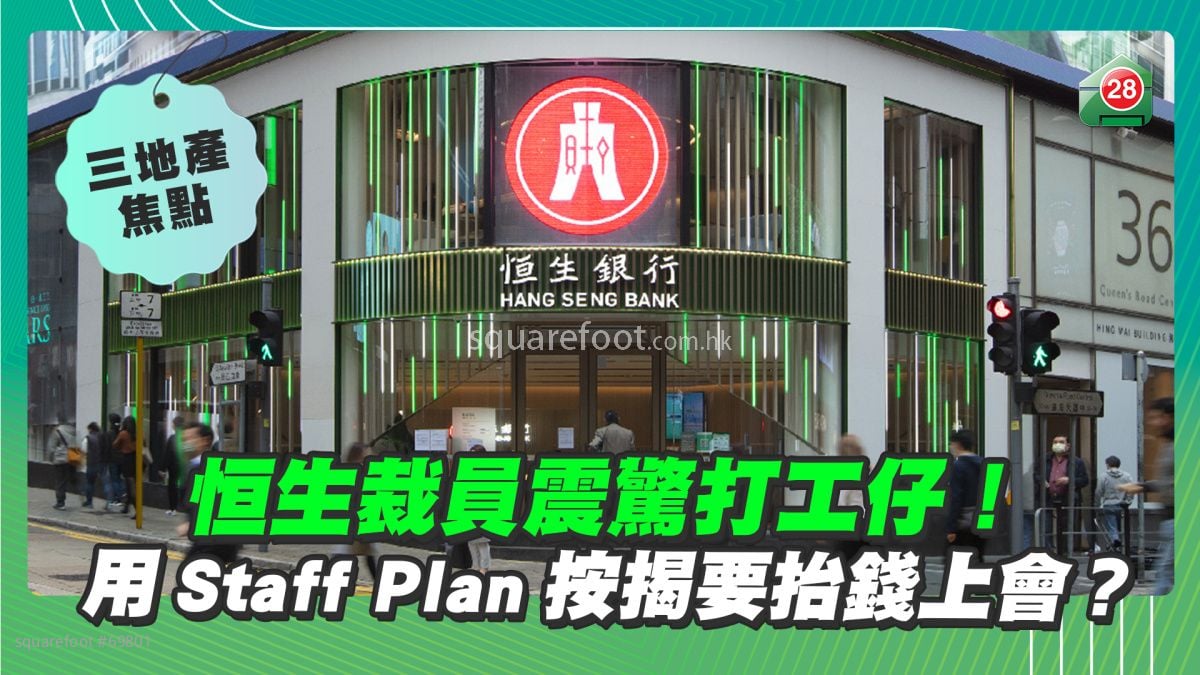- Home
- News
- Expert Blog
- Wed Property Focus
- What Can You Do With A Staff Mortgage During Bank Layoffs?
It has been reported that Hang Seng Bank has been laying off staff across various departments since March, with reductions ranging from 10% to 20% in most areas, and up to 50% in certain departments. For employees who were not laid off, regardless of their rank, they are required to reapply for their positions and compete with external applicants.
In response, Hang Seng Bank stated that to address the rapidly changing market environment and increasingly diverse customer needs, the bank regularly reviews its business portfolio and operations. The broader layoff action is part of a business adjustment, with the number of affected employees accounting for about 1% of the bank’s core business workforce.
The news of layoffs has caused widespread shock. Many are worried about two things: first, the possibility of a severe economic downturn in Hong Kong triggering a wave of layoffs, and second, a significant decline in the property market, leading to a rise in negative equity cases.
Earlier, the Hong Kong Monetary Authority released the latest survey results on negative-equity residential mortgages for the first quarter of 2025. The first quarter recorded 40,741 cases, up 6.12% from 38,389 cases in the fourth quarter of 2024, marking a 22-year high. These cases primarily involve housing mortgages taken out by bank employees or loans under mortgage insurance schemes, which typically feature higher loan-to-value ratios.
Some banks offer preferential housing schemes for their employees, commonly referred to as the "Staff Plan." These plans often offer significantly lower interest rates than standard market mortgages, sometimes below 1%. In certain cases, employees can secure loans covering over 90% of the property value, with some banks even offering up to 100%, making it easier for employees to enter the property market.
However, it’s important to note that the Staff Plan is a benefit exclusive to employees. If an employee resigns or is laid off, the bank will require the borrower to repay the mortgage in full immediately (a process known as a "Call Loan") to protect the bank’s interest. If the borrower fails to repay the outstanding loan within the specified timeframe, the bank has the right to repossess and auction the property.
For homeowners who are unable to repay the full mortgage amount after a Call Loan, what options do they have? One option is to sell the property. However, due to the urgency of the situation, the sale price may not be enough to cover the outstanding mortgage, leaving the homeowner responsible for additional payments to the bank. Alternatively, they can consider refinancing the property to continue making repayments.
That said, refinancing is not an easy task—particularly for homeowners who were laid off by their bank and were using a Staff Plan. The reasons are twofold: first, it can be difficult for these individuals to find new employment quickly; and second, new banks are likely to conduct strict mortgage approval checks, and without new proof of income, refinancing becomes challenging.
Even if refinancing is successful, homeowners may still face another hurdle: the loan-to-value ratio offered by the new bank may differ from the original Staff Plan. It is unlikely that the new mortgage will cover the entire outstanding loan, meaning homeowners may need to pay an additional amount upfront to secure the refinancing.
Like
| Property Type | Price | Ads Period |
|---|---|---|
| For Sale Property | ||
Normal Listing Typical One | HKD:1000 (or Hsemoney:1000) | Valid:90 days |
Golden Top Listing Higher position than Top listing 2-3times better performance | HKD:3000 (or Hsemoney:3000) | Valid:60 days |
| Rental Property | ||
Normal Listing Typical One | HKD:1000 (or Hsemoney:1000) | Valid:80 days |
Golden Top Listing Higher position than Top listing 2-3times better performance | HKD:3000 (or Hsemoney:3000) | Valid:60 days |
